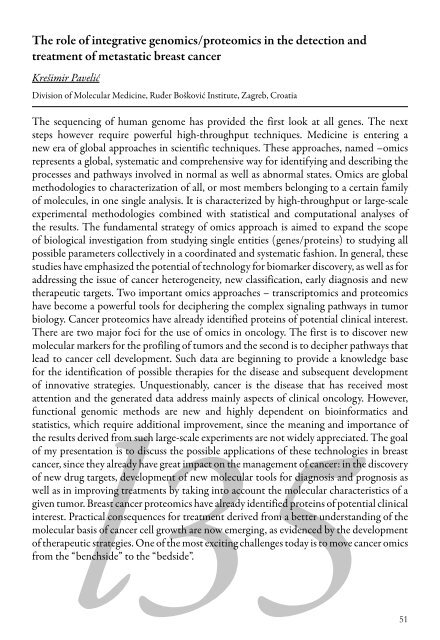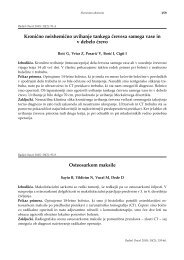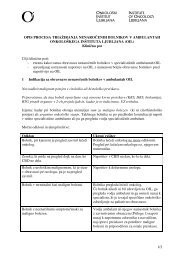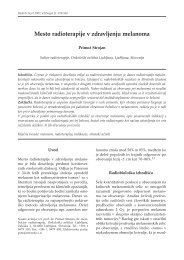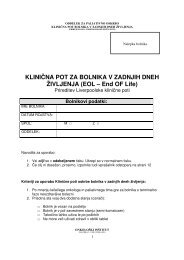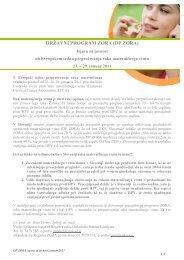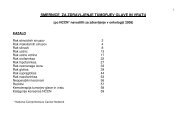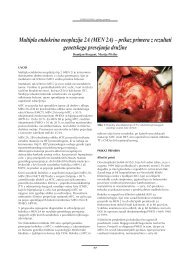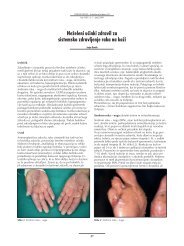Create successful ePaper yourself
Turn your PDF publications into a flip-book with our unique Google optimized e-Paper software.
The role <strong>of</strong> integrative genomics/proteomics in the detection and<br />
treatment <strong>of</strong> metastatic breast cancer<br />
Krešimir Pavelić<br />
Division <strong>of</strong> Molecular Medicine, Ruđer Bošković Institute, Zagreb, Croatia<br />
The sequencing <strong>of</strong> human genome has provided the first look at all genes. The next<br />
steps however require powerful high-throughput techniques. Medicine is entering a<br />
new era <strong>of</strong> global approaches in scientific techniques. These approaches, named –omics<br />
represents a global, systematic and comprehensive way for identifying and describing the<br />
processes and pathways involved in normal as well as abnormal states. Omics are global<br />
methodologies to characterization <strong>of</strong> all, or most members belonging to a certain family<br />
<strong>of</strong> molecules, in one single analysis. It is characterized by high-throughput or large-scale<br />
experimental methodologies combined with statistical and computational analyses <strong>of</strong><br />
the results. The fundamental strategy <strong>of</strong> omics approach is aimed to expand the scope<br />
<strong>of</strong> biological investigation from studying single entities (genes/proteins) to studying all<br />
possible parameters collectively in a coordinated and systematic fashion. In general, these<br />
studies have emphasized the potential <strong>of</strong> technology for biomarker discovery, as well as for<br />
addressing the issue <strong>of</strong> cancer heterogeneity, new classification, early diagnosis and new<br />
therapeutic targets. Two important omics approaches – transcriptomics and proteomics<br />
have become a powerful tools for deciphering the complex signaling pathways in tumor<br />
biology. Cancer proteomics have already identified proteins <strong>of</strong> potential clinical interest.<br />
There are two major foci for the use <strong>of</strong> omics in oncology. The first is to discover new<br />
molecular markers for the pr<strong>of</strong>iling <strong>of</strong> tumors and the second is to decipher pathways that<br />
lead to cancer cell development. Such data are beginning to provide a knowledge base<br />
for the identification <strong>of</strong> possible therapies for the disease and subsequent development<br />
<strong>of</strong> innovative strategies. Unquestionably, cancer is the disease that has received most<br />
attention and the generated data address mainly aspects <strong>of</strong> clinical oncology. However,<br />
functional genomic methods are new and highly dependent on bioinformatics and<br />
statistics, which<br />
l35<br />
require additional improvement, since the meaning and importance <strong>of</strong><br />
the results derived from such large-scale experiments are not widely appreciated. The goal<br />
<strong>of</strong> my presentation is to discuss the possible applications <strong>of</strong> these technologies in breast<br />
cancer, since they already have great impact on the management <strong>of</strong> cancer: in the discovery<br />
<strong>of</strong> new drug targets, development <strong>of</strong> new molecular tools for diagnosis and prognosis as<br />
well as in improving treatments by taking into account the molecular characteristics <strong>of</strong> a<br />
given tumor. Breast cancer proteomics have already identified proteins <strong>of</strong> potential clinical<br />
interest. Practical consequences for treatment derived from a better understanding <strong>of</strong> the<br />
molecular basis <strong>of</strong> cancer cell growth are now emerging, as evidenced by the development<br />
<strong>of</strong> therapeutic strategies. One <strong>of</strong> the most exciting challenges today is to move cancer omics<br />
from the “benchside” to the “bedside”.<br />
51


